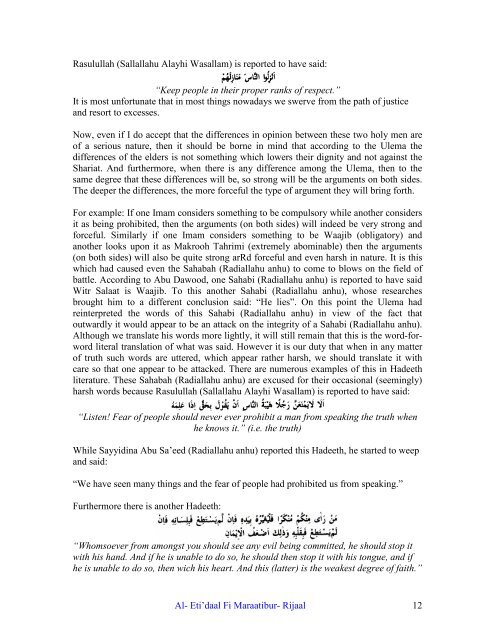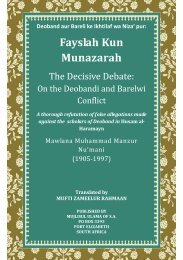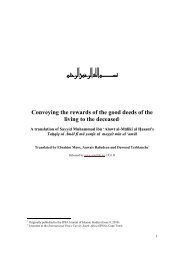al_etidaal_gn
al_etidaal_gn
al_etidaal_gn
You also want an ePaper? Increase the reach of your titles
YUMPU automatically turns print PDFs into web optimized ePapers that Google loves.
Rasulullah (S<strong>al</strong>l<strong>al</strong>lahu Alayhi Was<strong>al</strong>lam) is reported to have said:<br />
“Keep people in their proper ranks of respect.”<br />
It is most unfortunate that in most things nowadays we swerve from the path of justice<br />
and resort to excesses.<br />
Now, even if I do accept that the differences in opinion between these two holy men are<br />
of a serious nature, then it should be borne in mind that according to the Ulema the<br />
differences of the elders is not something which lowers their di<strong>gn</strong>ity and not against the<br />
Shariat. And furthermore, when there is any difference among the Ulema, then to the<br />
same degree that these differences will be, so strong will be the arguments on both sides.<br />
The deeper the differences, the more forceful the type of argument they will bring forth.<br />
For example: If one Imam considers something to be compulsory while another considers<br />
it as being prohibited, then the arguments (on both sides) will indeed be very strong and<br />
forceful. Similarly if one Imam considers something to be Waajib (obligatory) and<br />
another looks upon it as Makrooh Tahrimi (extremely abominable) then the arguments<br />
(on both sides) will <strong>al</strong>so be quite strong arRd forceful and even harsh in nature. It is this<br />
which had caused even the Sahabah (Radi<strong>al</strong>lahu anhu) to come to blows on the field of<br />
battle. According to Abu Dawood, one Sahabi (Radi<strong>al</strong>lahu anhu) is reported to have said<br />
Witr S<strong>al</strong>aat is Waajib. To this another Sahabi (Radi<strong>al</strong>lahu anhu), whose researches<br />
brought him to a different conclusion said: “He lies”. On this point the Ulema had<br />
reinterpreted the words of this Sahabi (Radi<strong>al</strong>lahu anhu) in view of the fact that<br />
outwardly it would appear to be an attack on the integrity of a Sahabi (Radi<strong>al</strong>lahu anhu).<br />
Although we translate his words more lightly, it will still remain that this is the word-forword<br />
liter<strong>al</strong> translation of what was said. However it is our duty that when in any matter<br />
of truth such words are uttered, which appear rather harsh, we should translate it with<br />
care so that one appear to be attacked. There are numerous examples of this in Hadeeth<br />
literature. These Sahabah (Radi<strong>al</strong>lahu anhu) are excused for their occasion<strong>al</strong> (seemingly)<br />
harsh words because Rasulullah (S<strong>al</strong>l<strong>al</strong>lahu Alayhi Was<strong>al</strong>lam) is reported to have said:<br />
“Listen! Fear of people should never ever prohibit a man from speaking the truth when<br />
he knows it.” (i.e. the truth)<br />
While Sayyidina Abu Sa’eed (Radi<strong>al</strong>lahu anhu) reported this Hadeeth, he started to weep<br />
and said:<br />
“We have seen many things and the fear of people had prohibited us from speaking.”<br />
Furthermore there is another Hadeeth:<br />
“Whomsoever from amongst you should see any evil being committed, he should stop it<br />
with his hand. And if he is unable to do so, he should then stop it with his tongue, and if<br />
he is unable to do so, then wich his heart. And this (latter) is the weakest degree of faith.”<br />
Al- Eti’da<strong>al</strong> Fi Maraatibur- Rija<strong>al</strong> 12




